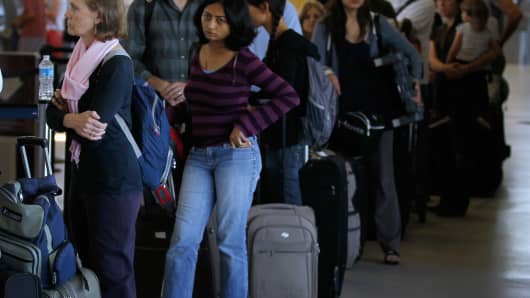From long delays at the nation's airports to huge potential lay-offs of government workers to less accurate weather forecasts, Americans may soon feel the pinch of austerity.
Despite political maneuvering by Republicans and the White House to find a solution to the so-called "sequester", there are no serious proposals to avoid the $1.2 trillion in automatic spending cuts that are expected to take effect on March 1.
What happens next is the subject of intense speculation on Capitol Hill. This is in part because the Obama administration has kept a lid on the details of how US government agencies would absorb $600 billion in spending cuts during the next decade and exactly which programs the Pentagon would slash to accomplish an extra $600 billion reduction.
(Read More: Senate Republicans Seek 7-Month Delay in Spending Cuts)
"Will the average person feel these cuts in a way that they will show some outrage or will they just go on and be kind of 'ho hum'. No one knows how this plays out," says Tom Davis, a former Republican congressman from Virginia.
"Virginia is going to be hit hard [because of its reliance on the defense industry], but if you are sitting out in Oshkosh, Wisconsin, they are saying 'it's about time'."
Budget experts describe a dire picture of the sequester's effect on economic activity and everyday life.
The most immediate impact would be likely to be felt by government workers. The Pentagon has said that 800,000 civilian employees would see their hours cut by 20 percent for the rest of the year and 46,000 temporary workers would be laid off.
Other agencies would also see deep cuts in staff. There are estimates of a 25 percent drop in border patrol agents, 600 fewer food safety inspectors at slaughterhouses and meat processing plants, and 1,200 fewer air traffic control operators.
"No one knows for sure what the impact is going to be. A great fear we have is that travel is the place we see the sequester up close and personal," says Geoff Freeman, executive vice-president of the US Travel Association, a lobby group that supports tourism.


